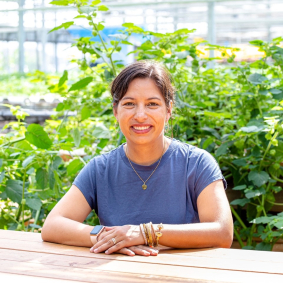Carolina Sanabria-Solano
M.Sc., 2012, and Ph.D. Virology and immunology, 2016
Plant Science Manager, Lufa Farms
“It is because of what I learned at INRS that I became the scientist I am today.”
Carolina Sanabria Solano discovered her passion for biology during her studies at the Lycée français Louis-Pasteur in Colombia. After obtaining her bachelor’s degree in biology from the National University of Colombia, Carolina decided to pursue graduate studies in microbiology. She chose the Institut national de la recherche scientifique and the research work of Professor Angela Pearson at the Centre Armand-Frappier Santé Biotechnologie research center. Under the direction of Prof. Pearson, Carolina completed her master’s degree and, in 2016, a doctorate. She recalls: “Since I knew what I wanted to do, I spent a lot of time looking for the university that best suited my expectations. I quickly realized that I belonged at INRS because their vision is similar to mine. It was possible for me to specialize in virology. A scientific discipline that interested me a lot. I found the study project that appealed to me with Angela Pearson, with whom I worked for seven years.”
She describes her time at INRS as memorable. “I really appreciated the trust I was given and the way scientific research is done. It is because of what I learned at INRS that I became the scientist I am today. I learned how to think, how to experiment to find answers, and how to develop problem-solving skills. It’s how you approach a problem that is more important than the outcome.”
Student life at INRS has also been very formative for Carolina. She was able to get involved in various student activities, including the Apprentice Researchers programme, and worked as an animator at the Armand-Frappier Museum’s summer camp. She also managed to work a few hours a week for a pharmaceutical partner at the research center during her studies.
After obtaining her PhD, Carolina naturally moved into the pharmaceutical field and became a medical consultant for a large company. She recalls, “Although my time in this industry was interesting, I felt a little disillusioned with the world of private research. Especially by the practices and profitability that are always increasing.”
During her pregnancy, she decided to transition her career and to seek to fulfill herself in the service of the community. She returned to her first love—plants—, which she had studied in her native Colombia. Agriculture is a field that still drives her today.
Since 2018, Carolina has served as the Plant Sciences Manager at Lufa Farms. She continues to do research, which she loves, while being responsible for improving the performance of Lufa Farms’ greenhouses. On a daily basis, Carolina manages a team of twelve agricultural experts in four urban greenhouses. These greenhouses are located on industrial building rooftops and one of them is the largest commercial rooftop greenhouse in the world. Carolina’s decisions affect the daily lives of more than 100 people (harvesters, packers, salespeople) and ensure that 23,000 Québec households receive fresh, healthy food that meets the highest standards of environmentally responsible food production every week. She also manages the R&D efforts of the greenhouses to optimize production. Carolina found what she was looking for in terms of community impact, but she didn’t stop there. At Lufa Farms, she manages a charitable program in collaboration with non-profit organizations to reduce food waste.
Does she have a piece of advice for INRS students? “Keep an open mind for the future. Be creative, there is no one path to a career in science. My experience is a very good example: I chose an atypical path. There is a whole range of opportunities that open up when you have that degree.”
Carolina has started her own company, Ecoresse, an eco-responsible enterprise that sources its wool from Québec breeders and recovers shorn wool to recycle it. She also makes her own vegetable dye. “In five or ten years, I see myself still working at the same job. With new greenhouses and in new countries. I want to continue working on urban agriculture and all the challenges it brings and thus participate in creating an innovative and sustainable model of food supply, for generations to come.”
[Interviewed in November 2022]

